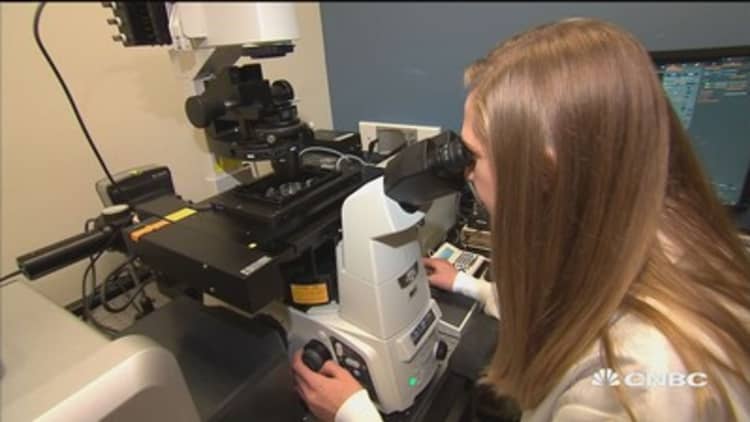Silicon Valley entrepreneur Christine Lemke has a rare genetic disease that causes inflammation of the joints and the spine, leaving her with frequent back pain.
Her pain might be severe at times, but it hasn't stopped her from running her venture-backed start-up Evidation Health, which works with pharmaceutical giants like Sanofi and Eli Lilly to help clinical research teams figure out if their medications are working for people in real life.
Evidation's thesis is that there's a lot to learn about people's experience of disease through their digital footprint. But to do that, they need to generate evidence through clinical studies of their own.
For Lemke, Evidation's latest research project hits close to home.
The goal for the "Discover Project" study, which kicks off on Monday, is to find out whether the latest technologies can be used to better measure chronic pain, which effects an estimated 100 million Americans. Researchers have found that despite the prevalence of pain, more research is needed to guide treatment decisions.
Evidation wants to fill that gap. And Lemke will be among the first to sign up to participate.
"Sometimes we take on studies out of curiosity, especially for questions that aren't well studied or well understood," she explained.
Effectively measuring pain has been a persistent challenge for decades.
Doctors still rely on subjective measurements, like asking patients to rate the intensity of their pain on a scale of 1 to 10. That's problematic. Some people have a higher pain tolerance than others. And as studies have found, feelings of helplessness and hopelessness can be a contributing factor in the experience of pain.
In addition, the liberal use of opioids for chronic pain produced a massive epidemic of prescription drug abuse and hundreds of thousands of deaths. Opioid overdoses are now the leading cause of death for Americans under the age of 50, according to the New York Times.
"For a long time, it was believed that a doctor's medical license would be at risk if they didn't treat the number (on the pain scale) the patient gave you," said Einar Ottestad, clinical associate professor of anesthesiology and pain medicine at Stanford University.
"Pain, being subjective, we simply haven't had great measures of it," he said.
Some believe that a more quantitative measure is possible, although there's been debate about that.
Researchers at Stanford have experimented with imaging the brain and using machine learning to study patterns of activity that relate to pain. This approach has promise in better determining varying levels and types of pain, but this method hasn't been successful in determining whether someone is in pain or not.
Using sensors to track pain trends
Lemke and the team at Evidation see an opportunity to use sensors -- the kind that are found in an iPhone or Fitbit -- as a way to track chronic pain patterns and trends.
The company is partnering up with Christine Sang, the director of translational pain research at Brigham and Women's Hospital's in Boston, to determine whether pain can be detected with these so-called "digital signals."
These signals include step counts, as a person in a great deal of pain might be less mobile, or they might experience changes in voice and speech. There might also be some heart rate variability, especially in moments of severe pain.
Ottestad, who is not affiliated with the study, says this approach has a lot of potential.
Wearable technologies can be useful, he said, in figuring out whether someone is in more or less pain. As a physician, he might also watch to see if a patient is more active once they've been prescribed a new medication.
Evidation is setting aside $1 million for the study, which will recruit 6,000 participants with chronic pain and 4,000 people without pain who will serve as a control. Participants will need to answer about a dozen screening questions, and will be able to participate entirely through smartphone -- there's no requirement to visit a clinic. They'll also get a small reward via Evidation's app.
The company plans to publish its results to the academic community, with the hopes that others will contribute to the research.
"It's a personal mission for me," said Lemke. "If it works, it could make a meaningful impact."
Related video: Drug companies search for non-addictive ways to treat pain



